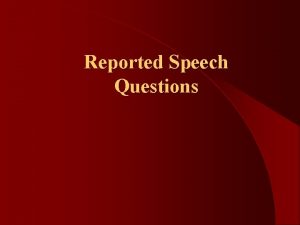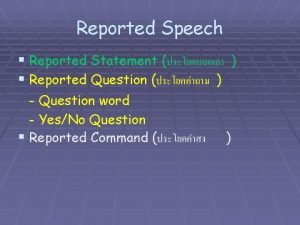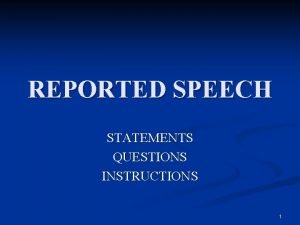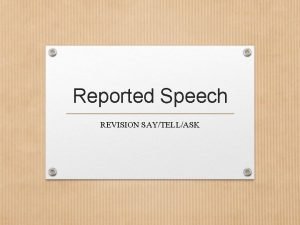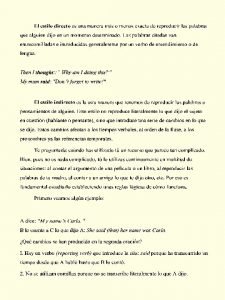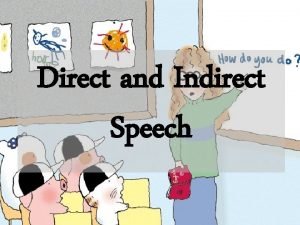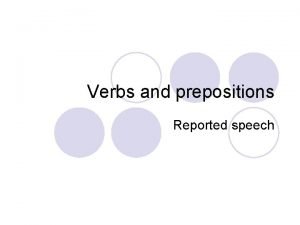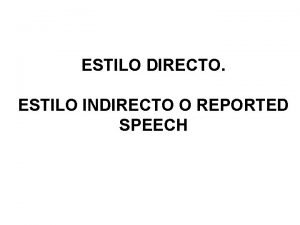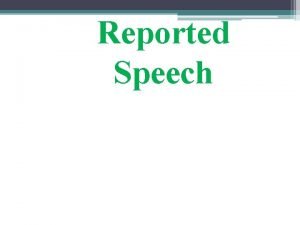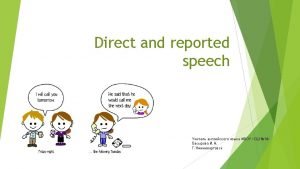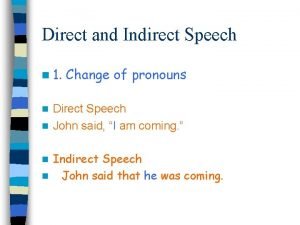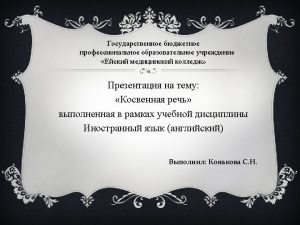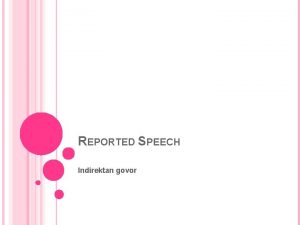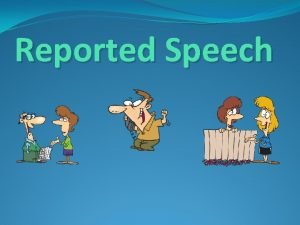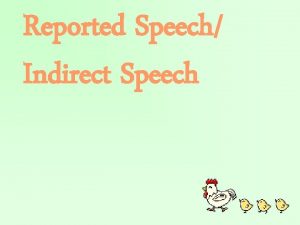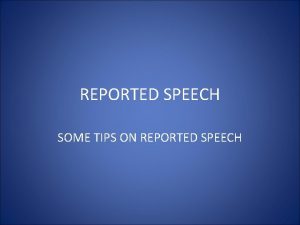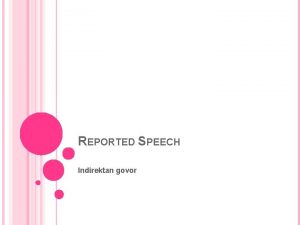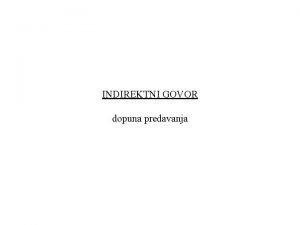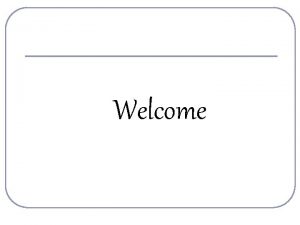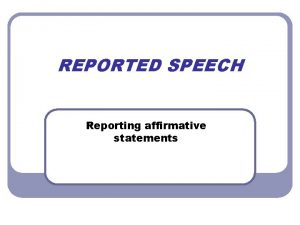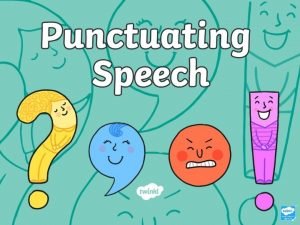Reported Speech Statements Indirektni govor Kada ponavljamo neto


















- Slides: 18

Reported Speech Statements

Indirektni govor • Kada ponavljamo nešto je neko rekao, možemo doslovno da navedemo njegove reči: l He said: "I like it. " l She asked: " Is it ready? " l John said: " Bring me my coat, please. " • Ovakav način ponavljanja tuđih reči naziva se upravni ili direktni govor. • Međutim, ako ne navodimo doslovno ono što je neko rekao, već to ponavljamo svojim rečima, mi pri tom činimo izvesne izmene. Ovakav način ponavljanja tuđih reči naziva se NEUPRAVNI ili i. NDIREKTNI govor.

Slaganje vremena • Indirektni govor (Reported speech) nam je potreban kada prepričavamo tuđe reči, tj. prenosimo đta je neko rekao. • Za ovakav govor nam je potrebno slaganje vremena (Sequence of Tenses), koje nije teško ako pratimo obrazac. • Ono što je jako bitno je ne tražiti paralelu u srpskom, jer je nećemo naći, pošto u srpskom ne postoji slaganje vremena.

Primeri u srpskom: Direktni govor Ana kaže: „Ja živim u zgradi. ” Ana je rekla: „Ja živim u zgradi. ” Indirektni govor Ana kaže da ona živi u zgradi. Ana je rekla da ona živi u zgradi.

• Dakle, bez obzira na vreme uvodnog glagola (reporting verb), u srpskom će ostatak rečenice biti u istom vremenu, tj. ne menja se vreme u direktnom i indirektnom govoru. Tu dolazimo do onog što je bitno za engleski jezik, jer je potrebno obratiti pažnju na slaganje vremena. Primeri u engleskom: Direct speech Ana says: ”I live in a building. ” Ana said: ”I live in a building. ” Reported speech Ana says she lives in a building. Ana said she lived in a building.

• Ako je uvodni glagol (reporting verb) kao što su say ili tell i sl. u prezentu, ništa se neće menjati, dakle glavni glagol ostaje u istom vremenu. • Međutim, ako je uvodni glagol (reporting verb) u prošlom vremenu (said, told), onda se i glavni glagol pomera jedno vreme unazad.

Svako vreme ide korak unazad - za početak, svaki present prelazi u svoju past varijantu: Present Simple - Past Simple Present Continuous - Past Continuous Present Perfect - Past Perfect Past Simple - Past Perfect - nema u šta da pređe, jer od njega nema „prošlije” can - could will - would must/have to - had to

Promena glagolskih vremena Present Simple > Past Simple ”I always drink tea“, she said. She said that she always drank tea. Present Continuous > Past Continuous ”I am writing a letter“, he explained. He explained that he was writing a letter. Past Simple > Past Perfect ”My father arrived on Saturday“, he said. He said that he had arrived on Saturday.

Present Perfect > Past Perfect ”I have just arrived“, he told me. He told me that he had just arrived. Past Continuous > Past Perfect Continuous ”We were living in Berlin“, they told me. They told me that they had been living in Berlin. Future Tense > Future in the Past ”I will be there on Monday“, she said. She said that she would be there on Monday.

Promena izraza za vreme now > then (at that moment) today > that day yesterday > the day before (the previous day) tomorrow > the next day (the following day) last week/month/year > the week/month/year before Zatim: here - there this - that these - those

Ukratko: Primer: Peter: "Misha, I saw your brother yesterday. " Peter told Misha that he had seen his brother the day before. 1. Uvodni glagol (reporting verb) najčešće je TOLD ili SAID (uvodni glagol u prošlom vremenu jer prepričavamo ono što je rečeno u prošlosti); ako ćemo pomenuti KOME je nešto rečeno, biramo TOLD, a ako je to nebitno - SAID (mada može i said to somebody) 2. Uvodi se reč THAT (u srpskom je to DA, npr. Rekao mi je DA će doći sutra); nekada se THAT može izostaviti 3. Menja se lična zamenica I u HE, jer Petar za sebe kaže JA, ali kada prepričavamo njegove reči kažemo da je ON nešto uradio (identičnu promenu vršimo i u našem jeziku).

4. SAW je prešlo u HAD SEEN, odnosno otišli smo za jedno vreme unazad – slaganje vremena 5. Prisvojni pridev YOUR se menja u HIS, što bi se desilo i na srpskom jeziku; da je ostalo YOUR ispalo bi da je Petar video TVOG brata, a ne Mišinog; da je umesto Miše npr. Ana, Petar bi video njenog brata (her) 6. YESTERDAY se menja u THE DAY BEFORE (može i the previous day), jer je u tom slučaju nebitno kada je Petar razgovarao sa Mišom. Jasno je, ipak, da je njegovog brata video dan pre razgovora.

Exercises: I Write these sentences in Indirect Speech, changing words where necessary. 1. “I’ll see you tomorrow”, she said. She said that she would see me the following day. 2. “I saw her today”, he said. He said that he had seen her that day. 3. “I don’t like this film”, she said. She said that she didn’t like that film. 4. She said, “We went swimming today. ” She said that they had gone swimming that day. 5. “I met her about three months ago”, he said. He said that he had met her about three months before.

6. “I’ll see Mary on Sunday”, she said. She said that she would see Mary on Sunday. 7. “Pete and Sue are getting married tomorrow”, she said. She said that Pete and Sue were getting married the next day. 8. “Stephen’s bringing some records to the party tomorrow”, she said. She said that Stephen was bringing some records to the party the next day. 9. “I really like this furniture”, she said. She said that she really liked that furniture. 10. “They were here three months ago”, he said. He said that they had been there three months before.

II Write these sentences in indirect speech. 1. “I see the children quite often”, he said. He said that he saw the children quite often. 2. “I’ve already met their parents”, she said. She said that he had already met their parents. 3. “I stayed in a hotel for a few weeks”, she said. She said that he stayed in a hotel for a few weeks. 4. “I must go home to make dinner”, he said. He said that he must/had to go home to make dinner. 5. “I haven’t been waiting long”, she said. She said that she hadn’t been waiting long.

III Change the following statements into the Reported Speech. 1. “I have something to show you”, I said to her that I had something to show to her. 2. “I’m going away tomorrow”, he said. He said that he was going away the next day. 3. “I’ve been in London for a month but I haven’t had time to visit the Tower”, said Rupert said that he had been in London for a month but he hadn’t had time to visit the Tower. 4. “We have a lift but very often it doesn’t work”, they said. They said that they had a lift but very often it didn’t work. 5. “I found an old Roman coin in the garden yesterday”, he said. He said that he had found an old Roman coin in the garden the day before.

IV Change the direct speech into the reported speech: 1. "I've already done it“, he said. He said that he had already done it. 2. "I saw you at the station“, she told him. She told him that she had seen him at the station. 3. "I can't help you“, he said. He said that he couldn’t help me. 4. "I may come a bit late“, Peter said that he might come a bit late. 5. "I went to shops“, John said he had gone to shops.

6. "I don't want to put this shelf here“, Mark told me that he didn’t want to put that shelf there. 7. "We can do it now“, he told her. He told her that they could do it then. 8. "I entered the university yesterday“, she explained. She explained that she had entered the university the day before. 9. "I'll manage to finish the project tomorrow“, Susan said that he would manage to finish the project the next day. 10. "We are writing a test today“, he said. He said that they were writing a test that day.
 Reported speech exercises
Reported speech exercises Indirektne recenice nemacki
Indirektne recenice nemacki Jane said that she had worked late last night
Jane said that she had worked late last night Quoted and reported speech
Quoted and reported speech Reported speech before
Reported speech before Reported speech commands
Reported speech commands Rewrite the statements as reported speech
Rewrite the statements as reported speech Direct speech words
Direct speech words Quoted speech
Quoted speech Reported speech present simple
Reported speech present simple Direct speech into reported speech
Direct speech into reported speech Sentence from direct to indirect speech
Sentence from direct to indirect speech Match the verbs and prepositions from
Match the verbs and prepositions from Adverbios reported speech
Adverbios reported speech Reported speech
Reported speech Philip said i was playing football in reported speech
Philip said i was playing football in reported speech Direct speech and reported speech
Direct speech and reported speech He said i am glad they are strong using indirect speech
He said i am glad they are strong using indirect speech Wh question indirect speech
Wh question indirect speech
